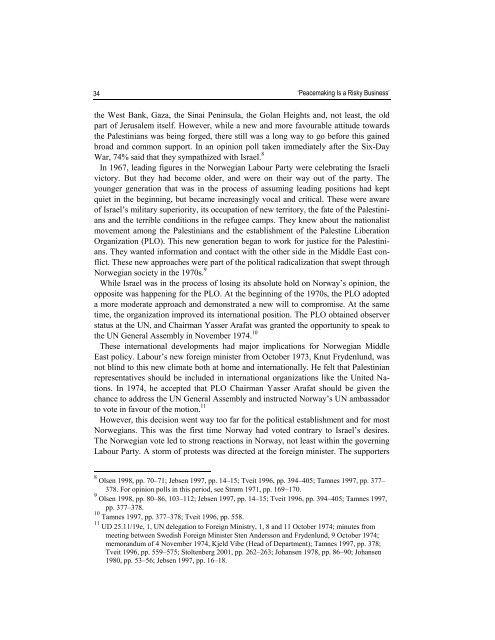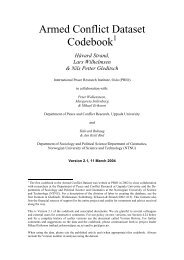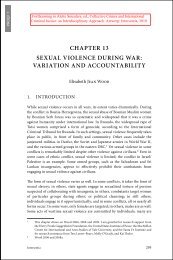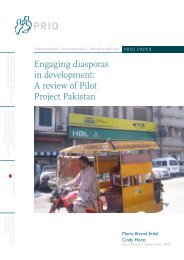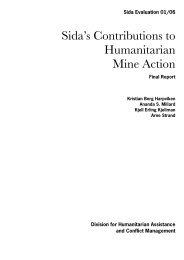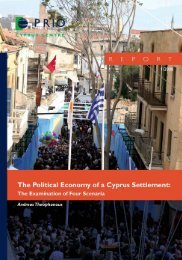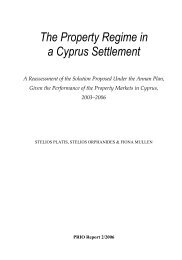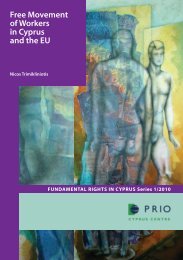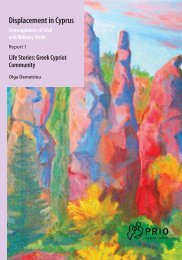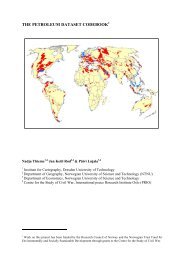Peacemaking Is a Risky Business - PRIO
Peacemaking Is a Risky Business - PRIO
Peacemaking Is a Risky Business - PRIO
Create successful ePaper yourself
Turn your PDF publications into a flip-book with our unique Google optimized e-Paper software.
34 ‘<strong>Peacemaking</strong> <strong>Is</strong> a <strong>Risky</strong> <strong>Business</strong>’the West Bank, Gaza, the Sinai Peninsula, the Golan Heights and, not least, the oldpart of Jerusalem itself. However, while a new and more favourable attitude towardsthe Palestinians was being forged, there still was a long way to go before this gainedbroad and common support. In an opinion poll taken immediately after the Six-DayWar, 74% said that they sympathized with <strong>Is</strong>rael. 8In 1967, leading figures in the Norwegian Labour Party were celebrating the <strong>Is</strong>raelivictory. But they had become older, and were on their way out of the party. Theyounger generation that was in the process of assuming leading positions had keptquiet in the beginning, but became increasingly vocal and critical. These were awareof <strong>Is</strong>rael’s military superiority, its occupation of new territory, the fate of the Palestiniansand the terrible conditions in the refugee camps. They knew about the nationalistmovement among the Palestinians and the establishment of the Palestine LiberationOrganization (PLO). This new generation began to work for justice for the Palestinians.They wanted information and contact with the other side in the Middle East conflict.These new approaches were part of the political radicalization that swept throughNorwegian society in the 1970s. 9While <strong>Is</strong>rael was in the process of losing its absolute hold on Norway’s opinion, theopposite was happening for the PLO. At the beginning of the 1970s, the PLO adopteda more moderate approach and demonstrated a new will to compromise. At the sametime, the organization improved its international position. The PLO obtained observerstatus at the UN, and Chairman Yasser Arafat was granted the opportunity to speak tothe UN General Assembly in November 1974. 10These international developments had major implications for Norwegian MiddleEast policy. Labour’s new foreign minister from October 1973, Knut Frydenlund, wasnot blind to this new climate both at home and internationally. He felt that Palestinianrepresentatives should be included in international organizations like the United Nations.In 1974, he accepted that PLO Chairman Yasser Arafat should be given thechance to address the UN General Assembly and instructed Norway’s UN ambassadorto vote in favour of the motion. 11However, this decision went way too far for the political establishment and for mostNorwegians. This was the first time Norway had voted contrary to <strong>Is</strong>rael’s desires.The Norwegian vote led to strong reactions in Norway, not least within the governingLabour Party. A storm of protests was directed at the foreign minister. The supporters8 Olsen 1998, pp. 70–71; Jebsen 1997, pp. 14–15; Tveit 1996, pp. 394–405; Tamnes 1997, pp. 377–378. For opinion polls in this period, see Strøm 1971, pp. 169–170.9 Olsen 1998, pp. 80–86, 103–112; Jebsen 1997, pp. 14–15; Tveit 1996, pp. 394–405; Tamnes 1997,pp. 377–378.10 Tamnes 1997, pp. 377–378; Tveit 1996, pp. 558.11 UD 25.11/19e, 1, UN delegation to Foreign Ministry, 1, 8 and 11 October 1974; minutes frommeeting between Swedish Foreign Minister Sten Andersson and Frydenlund, 9 October 1974;memorandum of 4 November 1974, Kjeld Vibe (Head of Department); Tamnes 1997, pp. 378;Tveit 1996, pp. 559–575; Stoltenberg 2001, pp. 262–263; Johansen 1978, pp. 86–90; Johansen1980, pp. 53–56; Jebsen 1997, pp. 16–18.


